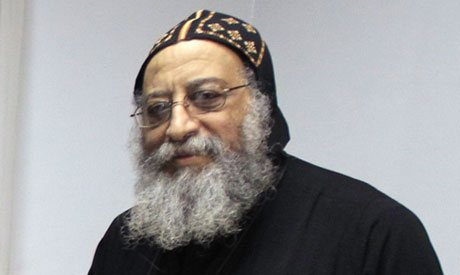 "It has been so dark for Copts lately, and Pope Tawadros II seems to be the light at the end of the tunnel," Miriam Nasser, a 30-year-old housewife told Ahram Online at St Mark's Cathedral in Cairo's Abbasiya district after Tawadros was named the church's 118th patriarch on Sunday morning.
"It has been so dark for Copts lately, and Pope Tawadros II seems to be the light at the end of the tunnel," Miriam Nasser, a 30-year-old housewife told Ahram Online at St Mark's Cathedral in Cairo's Abbasiya district after Tawadros was named the church's 118th patriarch on Sunday morning.
The cathedral, packed with thousands of congregants, was rocked with cheers as interim pope Bishop Pachomios unfolded the ballot – chosen at random by a blindfolded child – bearing the new patriarch's name.
"This is God's plan. We are all delighted, especially given that Tawadros is a wise man," Bishop Konstantin Nadib of Alexandria's Mar Girgis Church told Ahram Online.
Tawadros had served as the assistant to Bishop Pachomios, who was appointed acting patriarch following Pope Shenouda's death in March. Many Copts see Tawadros as a worthy successor to the much-loved Pope Shenouda III, as he was a member of the late pope's inner circle.
Right after the new pope was announced, Pachomios, leading the mass, noted a happy coincidence: "Today also marks the [60th] birthday of Pope Tawadros." Many Coptic observers saw the coincidence as an indication of God's pleasure with the choice of new pope.
Besides being seen as God's preferred candidate, all those that have worked closely with Tawadros say he is worthy of the papal seat.
"He's a good manager and spiritual leader; he's the best of the three candidates who made it to the final stage," Michael Mounir, a Coptic activist and founder of the Hayah Party, told Ahram Online.
Men and women, old and young, along with public figures and media personnel attended the Sunday mass at St Mark's. Some even slept in the cathedral to ensure a seat at the papal selection ceremony.
The new pope, however, will have a tough time meeting the high expectations of his congregation and the challenges currently facing Egypt. Copts are concerned both with maintaining their orthodox faith and guaranteeing Coptic rights on the ground.
"We need the new pope to bring back Wednesday sermons at the cathedral," Mina Fawaz, a 21-year-old accountant who attended the mass, told Ahram Online. "Pope Shenouda's death left us all a bit scattered."
Late Pope Shenouda III, who had led the church for 40 years, used to hold weekly sermons each Wednesday, heavily attended by congregants.
Following Egypt's revolution early last year, many Copts demanded that the pope treat the Coptic laity with greater transparency, discussing all issues with them and acknowledging the fact that "Coptic youth are now engaging in politics, unlike the era of the late Pope Shenouda III," Sabry Shafiq, 36, who volunteers at the church, told Ahram Online.
Copts expect the new pope to guarantee their rights, make them feel safe and pursue pending legal cases, including that of the 'Maspero Massacre' – in which dozens of Coptic demonstrators were killed – that took place in October of last year.
"We need to have equal rights as citizens in this country," 33-year-old accountant George Foaud told Ahram Online.
Known for his strictness, the new pope is expected to reorganise the church from within; set specific rules for the promotion of monks and priests; and reorganise controversial 1957 church bylaws regulating papal elections.
Egypt's constitution is also a crucial stop on the new pope's to-do list. Copts expect him to obtain state approval to amend the church's 1938 bylaws, which lay down the controversial rules governing Coptic divorce and remarriage.
"We must find middle ground between judges and the way Copts want their laws to be applied in personal-status issues," lawyer Nabil Gobraial told Ahram Online.
Pope Tawadros is a member of the Coptic Church's Holy Synod. He was born in 1952 and studied pharmaceutical sciences at Alexandria University. He was ordained bishop in 1997.
Tawadros will be formally coronated Egypt's 118th pope on 18 November.
"We have high hopes that Copts will see better days after being forced to leave their homes, having their churches torched and having been killed by army troops over the past year and a half," Madlene Anwar, 37, told Ahram Online.
Egypt's Copts see new pope as 'light at end of tunnel'
By-Ahram
Copts and Poliltical Islam
00:11
Monday ,05 November 2012



